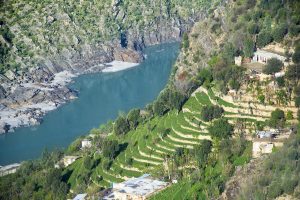The Indus River system is a vital resource for 300 million people in India and Pakistan. The World Bank mediated the 1960 Indus Water Treaty (IWT), which was envisioned as a permanent resolution to water-sharing disputes. However, with the growing impacts of climate change, the IWT has emerged as a point of contention. Failing to address these impacts could lead to migration crises and supply chain disruptions, or even trigger a conflict between nuclear-armed nations. The IWT should be updated to include climate change-related data-sharing and the division of “tradeable goods” from the river system.
Currently, the Indus River Basin’s water supplies are overstretched. Projections indicate that, due to rising temperatures between now and 2030, the Indus River Basin will face a water deficit of 50 percent. The projected demand from India alone will be twice the available supply.
Climate change will also lead to a rise in erratic droughts and floods in both countries. Global climate models indicate that the basin has already experienced increased rainfall. Unpredictable flooding poses a significant threat to populations residing in the basin and adversely affects agricultural productivity. In addition to changing hydrological cycles, the quality of water is also declining, leading to health risks and reduced biodiversity.
Climate change pressure on the Indus River system can have adverse effects, such as large-scale migration, disruption of agricultural supply chains, and energy shortages, as was seen in Central Java, Indonesia, which also faces climate-induced river overflows. Experts have posited that water disputes between India and Pakistan could potentially lead to an armed conflict between two nuclear powers.
The IWT should be amended to reflect growing climate change concerns. Amendments should focus on two areas: building and strengthening data collection streams and monetary quantification of water resources.
The IWT relies on historical data to predict water supplies; the assumption is that the supply will remain consistent. However, this no longer holds true due to climate change.
While some data-sharing mechanisms do exist, the IWT should emphasize building mechanisms to quantify and collect data regarding climate change, while also strengthening existing data collection and sharing streams.
Currently, there is minimal dialogue or data sharing between the two countries on the IWT. India and Pakistan should compile an annual detailed report on the evaluation of the river basin’s hydrological reactions to changing climate. The data could examine how climate change, land use change, and human activities reduce flow magnitudes in numerical terms.
Furthermore, while the IWT requires both nations to disclose flow data, this rarely happens. Additionally, the validity of provided data is in doubt. Therefore, riparian states must share data with the World Bank to ensure accountability. A similar information exchange was successfully implemented for the Mekong Reserve Commission.
Since issues of climate change can have unexpected implications for the IWT, periodic reassessment of its terms should be built into the structure to emphasize continued collaboration under the mediation of the World Bank.
The treaty should be altered so that management and ownership of resources can be quantified in terms of monetary value. This would allow water and river resources to be seen as tradable commodities. This includes structured sharing of direct benefits arising from water extraction and utilization such as wetlands, fish biodiversity as well as the health and productivity of fisheries.
To incentivize ecological improvement, benefits can be more adequately quantified in the IWT. Such management may indirectly provide goods and services that people value, such as fish for human consumption, lower water treatment costs, and other benefits. Therefore, despite frosty relations, the two countries would be incentivized to take this up for mutual benefit. After a review and assessment of quantified benefits, negotiations over divisions could be overseen by the World Bank. Other aspects such as agricultural production and urban/industrial water supply should be reasonably divided.
A similar agreement was successful in 2013 for the Senegal River Basin Multi-Purpose Water Resources Development Project, which improved the development of transboundary waterways, cross-border malaria prevention, and the development of hydroelectric generating. Through irrigation, fishery development, and agroforestry, the project improved stakeholder communities’ quality of life while generating over 18,000 new jobs and significantly increasing income for the fishing and agricultural subsectors.
The dispute between India and Pakistan over the Indus River will only be exacerbated due to the escalating effects of climate change. Regular data sharing, periodic reviews of the treaty’s provisions, and dividing tradeable goods from the river system can prevent further escalation.
This article was originally published on New Perspectives on Asia from the Center for Strategic and International Studies and is reprinted with permission.

































